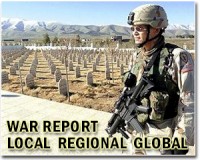 |
Vienna, Va. (UPI) Mar 3, 2011 The recent U.S. House of Representatives vote to eliminate funding for the U.S. Institute of Peace sets the stage for an important debate that should be joined by legislators and the American public. It does no good to indulge in hand-wringing about the symbolic importance of a publicly funded institution dedicated to peace or to compare this small agency's annual budget of just less than $43 million with the tens of billions spent on military procurements each year. Astronomical deficits necessitate very close examination of all budget lines to ensure that we are getting the most bang for our buck, particularly with respect to national defense. Before zeroing out small agencies that don't have the vocal constituency of well-established entitlement programs, Congress and the electorate have a duty to examine which programs are best equipped to respond to a complex array of global challenges confronting the United States in a new century. It has become almost axiomatic that smart foreign policy consists of a carefully calibrated mix of development, defense and diplomacy, the so-called 3-D approach. As has been rightly noted by various commentators, we have the Department of Defense for defense, U.S. Agency for International Development for development and the folks at Foggy Bottom for diplomacy. Why, then, do we need the U.S. Institute of Peace, which appears to be duplicating the efforts particularly of the State Department? The simple answer is USIP generates intellectual capital that far exceeds the modest financial investment made by taxpayers in its programs and operations. Such capital is the coin of the realm as we move forward in a century where brain will increasingly overwhelm brawn in advancing the cause of freedom. The aforementioned agencies certainly engage in planning and they feature a multitude of platforms for education and training. Most of this, however, is driven by operational demands, leaving little time for study, analysis and reflection of an overarching, conceptual nature, save by the fortunate few who earn fellowships or other opportunities for extended study away from the workplace. Such opportunities are episodic in nature and don't constitute a systematic effort to foster new thinking. So, how does new thinking supported by USIP programs contribute to national security? Looking back two decades to a period when I was associated with USIP, I remember a couple of small grants we made to a relatively obscure organization in Cambridge, Mass., called the Albert Einstein Institution. The grants were awarded for projects associated with the work of the organization's head, Gene Sharp. Sharp isn't exactly a household name in foreign policy circles. His work focuses on nonviolent resistance. It has about it the practical force of social activism perfected by Saul Alinsky who organized the poor some 50 years ago in the United States. As news pours in about revolutions in the Arab world, the only Western name that keeps cropping up as a source of inspiration and guidance is Gene Sharp. Turns out his work, especially the highly inventive "198 Methods of Nonviolent Action," has been a font of ideas for pro-democracy movements in Tunisia and Egypt as well as in other closed societies from Myanmar to Zimbabwe. As of a year ago, the United States had spent more than $700 billion bringing democracy to one country, Iraq. From a geostrategic perspective, this may have been a good investment, but from a strictly economic standpoint, it was a disaster, and it is the economy Congress is interested in right? So let's think hard, what is a better investment, $43 million in a peace institute that supports folks with ideas that help drive pro-democracy revolutions around the world or hundreds of billions for a military engagement in a single country that is increasingly hostile to U.S. "meddling"? (Hrach Gregorian is president of the Institute of World Affairs, which has received grants from USIP, and was director of the Grants and Education and Training Programs at USIP from 1988 to 1994.) (United Press International's "Outside View" commentaries are written by outside contributors who specialize in a variety of important issues. The views expressed do not necessarily reflect those of United Press International. In the interests of creating an open forum, original submissions are invited.)
Share This Article With Planet Earth
Related Links
 Norway warns Israel over peace deadlock: report
Norway warns Israel over peace deadlock: reportJerusalem (AFP) March 3, 2011 Norway may unilaterally recognise a Palestinian state if there is no progress in efforts to end the conflict with Israel, Oslo's top diplomat said in an interview published Thursday. "I would like to be the first to recognise the state of Palestine when negotiations have been completed," Jonas Gahr Stoere told the left-leaning Haaretz newspaper. "I say so as long as there is a prospect f ... read more |
|
| The content herein, unless otherwise known to be public domain, are Copyright 1995-2010 - SpaceDaily. AFP and UPI Wire Stories are copyright Agence France-Presse and United Press International. ESA Portal Reports are copyright European Space Agency. All NASA sourced material is public domain. Additional copyrights may apply in whole or part to other bona fide parties. Advertising does not imply endorsement,agreement or approval of any opinions, statements or information provided by SpaceDaily on any Web page published or hosted by SpaceDaily. Privacy Statement |